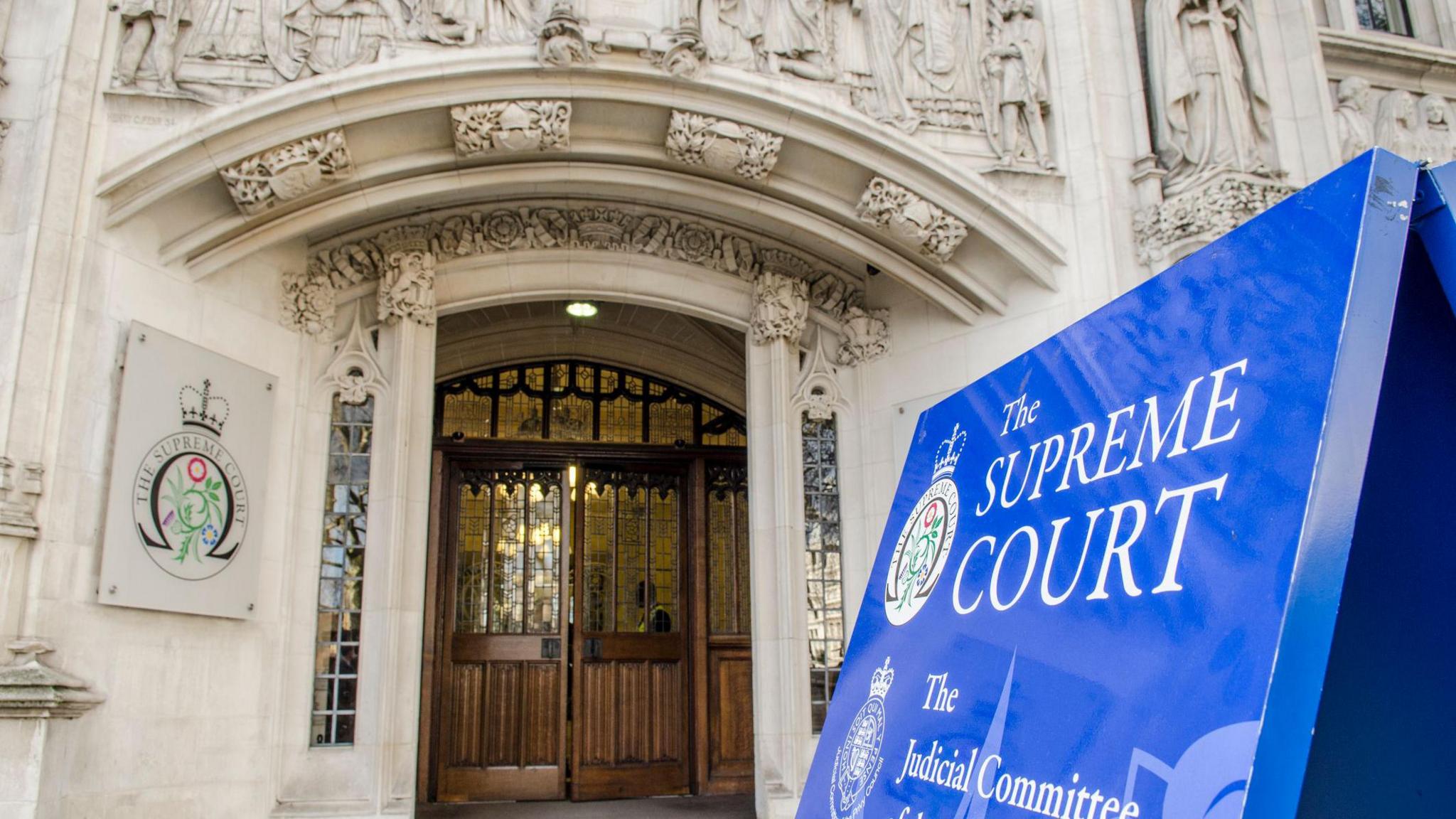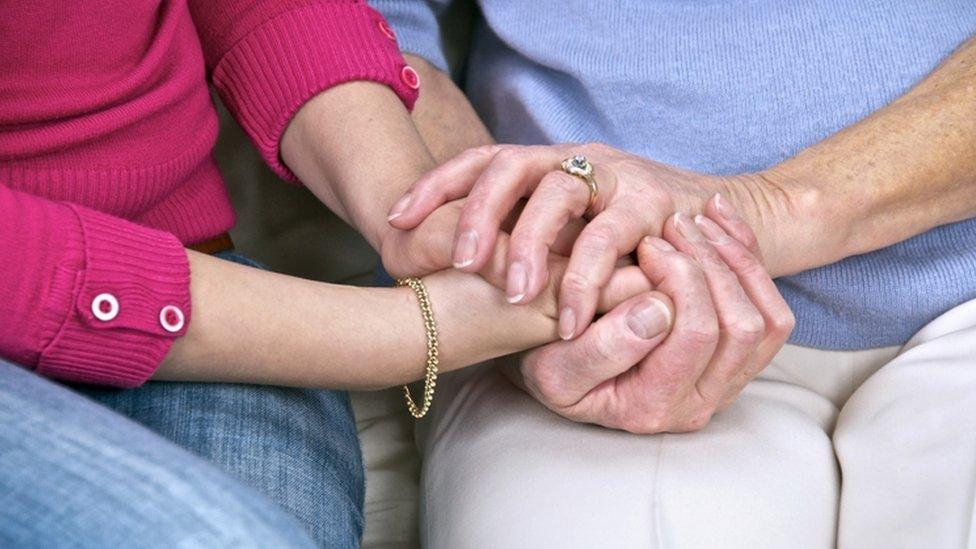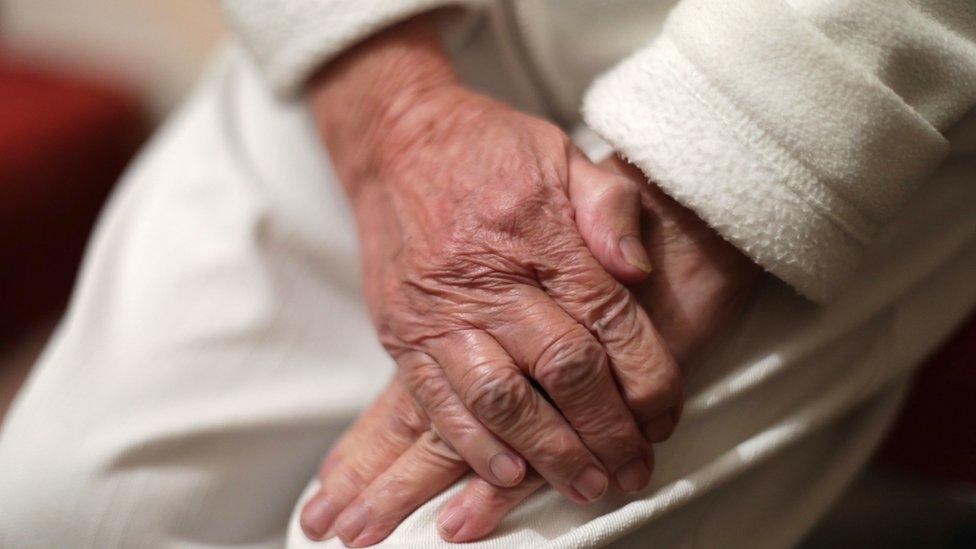Thousands of disabled people at risk from 'back door' law change, say charities

- Published
Severely disabled people could be neglected or harmed if the government succeeds in overturning legal protections for them, charities have warned.
The Supreme Court has been hearing arguments this week against one of its previous rulings that broadened the definition of what it means for someone to be deprived of their liberty if they lack the capacity to consent to their care arrangements.
The Department of Health and Social Care (DHSC) argues that a 2014 ruling known as Cheshire West, which established legal safeguards for people who have been deprived of their liberty, was "wrongly decided" and resulted in a significant increase in referrals.
Three charities - Mencap, Mind and the National Autistic Society - have said the intervention is "deeply troubling" and will put thousands of disabled people are risk.
DHSC said it has a responsibility to ensure the "legal framework operates effectively", during the hearing that concluded on Wednesday.
The 'acid test'
Cheshire West widened the definition of deprivation of liberty safeguards (DoLS) compared with what had previously been the case in England and Wales.
In its 2014 ruling, the Supreme Court established an 'acid test' that if someone is under continuous supervision and control, is not free to leave and cannot consent to this, they are 'deprived of their liberty'.
This usually applies to people with a severe learning disability or dementia living in locked rehabilitation units or community placements such as supported living or care homes.
These legal safeguards ensure an independent person checks that such arrangements are justified, lawful, and in the person's best interests.
"The existing ruling... provides key safeguards for people in highly restrictive settings like rehabilitation units or community placements like supported living or care homes," said Mencap, Mind and the National Autistic Society in a joint statement.
"The protections make sure people have someone to advocate on their behalf, that they can challenge their living arrangements, and that their care needs are dictated by what's best for them, not the convenience of others."
In its intervention, the DHSC argues that Cheshire West was wrongly decided and creates an unsustainable administrative burden on health and social care systems.
It wants to refocus safeguards on identifying individuals' known wishes and feelings, rather than applying a blanket legal test.
Sharp rise in cases
The 2014 judgment led to a huge increase in cases and backlogs.
According to the latest NHS statistics, external, the number of DoLS applications made in England in 2023-24, was 332,455, up more than 300,000 from a decade earlier.
There is also a backlog of 123,790 cases.
The DoLS process has faced criticism for being overly bureaucratic, with many having to undergo an annual assessment.
In written submissions for the hearing, Joanne Clement KC for DHSC said, "the United Kingdom is in the throes of what has been termed 'a great confinement' – the mass authorisation of deprivation of liberty of a significant proportion of the disabled population.
"The Secretary of State is anxious to ensure that those who require the protections of Article 5 receive them, without needless intrusion into the lives of those who do not."
Over the weekend the government announced, external it will launch a consultation on replacing DoLS with the Liberty Protection Safeguards (LPS), which will "streamline processes and reduce the backlog of applications – focusing on those most vulnerable."
Care minister, Stephen Kinnock described DoLS as a "broken system", characterised by "intrusive assessments" that were distressing for families, and that the reform would deliver "the best protections and safeguards possible".
How has this come about?
The DHSC has intervened in a Supreme Court case brought by the Attorney General of Northern Ireland (AGNI), who wants to depart from the Cheshire West 'acid test' and what is considered a 'deprivation of liberty'.
The AGNI wants to revise the region's DoLS so that a person can give valid consent to their confinement, through the expression of their wishes and feelings, even though they lack relevant capacity.
In written submissions on behalf of the AGNI, Tony McGleenan KC, said "That wider definition – taking account of the person's wishes and feelings – would mean that fewer people aged 16 and above with impaired decision-making capacity would be regarded as deprived of their liberty in the context of the delivery of health and social care.
"Safeguards would still be required... but those safeguards would focus on identification of the person's known wishes and feelings."
Currently powers in Northern Ireland are limited so that the proposed revision to the Code will only be lawful if it is compatible with the rights protected by the ECHR.
Mencap, Mind, and the National Autistic Society said the issue was "far too important a change to be done by the back door".
The charities said after the hearing that they "continue to have deep concerns about the AGNI's and DHSC's arguments.
"The changes being proposed are significant and put at risk the freedom, safety, and rights of thousands of disabled people."
A DHSC spokesperson said:
"The department can't comment on the details of active legal proceedings.
"We have a responsibility to ensure the legal framework operates effectively and we are committed to protecting the rights and safeguarding of all people, including those with learning disabilities and autism.
"We will continue to work with stakeholders to ensure appropriate protections remain in place."
The seven justices will reserve judgment till a later date.
- Published1 October 2014
- Published13 March 2017

- Published19 February 2021
